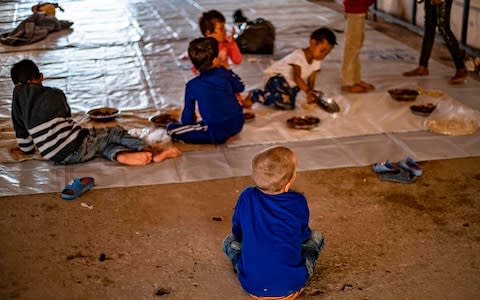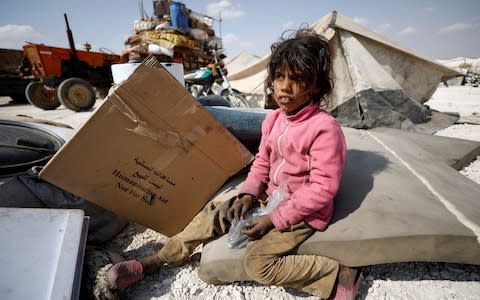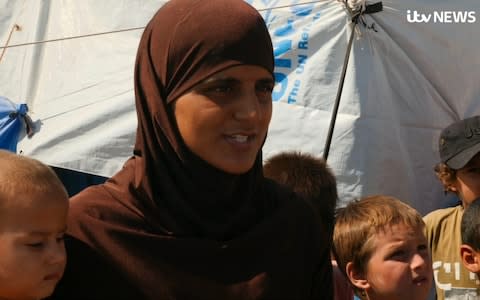British orphaned children of Isil fighters rescued from Syria camp after 'prison break'

Three British orphaned children of Islamic State fighters who went missing after their camp in Syria came under Turkish attack have been rescued by the UN.
The children were picked up by aid workers from the UN’s refugee agency after the women who had been detained in Ain Issa camp escaped, Save the Children told The Daily Telegraph.
According to local reports, Turkish warplanes struck villages near the detention camp, which is 20 miles south of the Turkish-Syrian border, and hundreds of women and children escaped as clashes broke out between Turkey-backed Syrian fighters and Kurdish forces.
The British identity of Amira, 10, her sister, Hiba, eight, and their brother Hamza, was discovered by the BBC earlier this week.
The children are believed to have travelled to Syria with their parents from London five years ago.

Their mother and father, an older brother and two other sisters were killed in air strikes on the last of Isil's territory, which finally fell to Kurdish led-forces in March.
The children, who now speak Arabic, remember little of their lives before they were taken to live in the caliphate and could not tell journalists their surname.
“They are young and traumatised,” said Sonia Kush, Syria Response Director at Save the Children. “There were 12 children in the camp that arrived without documentation: some know their nationalities, some, like these children, are not sure.”
She said they had been taken to a centre in the city of Raqqa and efforts were being made to try to establish their surname and if they had any extended family in the UK.

“We have been warning about this scenario for some time,” she told The Telegraph. “And we say again: the foreign governments need to take responsibility for their citizens.”
The British government has so far refused the return of Isil fighters and their families, despite pressure from the US-led coalition and their Kurdish allies.
According to Frederica Mogherini, EU foreign affairs chief, the topic was not discussed at Monday's EU summit despite protracted debate on the situation in Syria.
Among those who fled the camp on Sunday was notorious Isil recruiter from Walthamstow, Tooba Gondal, 25, who made contact with her family on Sunday to tell them she had run away and was now “walking the streets”.
Fellow Londoner Zara Iqbal, former Irish soldier Lisa Smith and “Beatle” Alexanda Kotey’s Syrian wife are also thought to have escaped and are now unaccounted for.
According to Ms Kush, the women overcame the camp’s guards in the chaos that ensued after the Turkish strikes and grabbed back their documentation and phones which were held in the office.

She said some of the women escaped and then returned, making the calculation that they would better off under the Turkish-backed Syrian rebels - which briefly seized control of the camp - than Kurdish or regime forces.
The situation around Ain Issa is fluid. It is located south of Turkey’s proposed safe zone and is likely to now come under the control of the Syrian government after it struck a deal with the Kurds.
Isil supporters on the encrypted Telegram group were understood to be attempting to help them smuggle out to areas under the control of Turkish forces. Most do not want to risk being detained by the Syrian government, which has tortured and executed more than 11,000 people in its prisons.

According to sources close to the regime, talks are ongoing about the fate of thousands of foreign Isil prisoners detained in Isil-held prisons.
One who asked not to be named told The Telegraph he believed they too would eventually come under the regime’s control, who could use the prospect of their release as leverage against Western governments.

 Yahoo News
Yahoo News 
